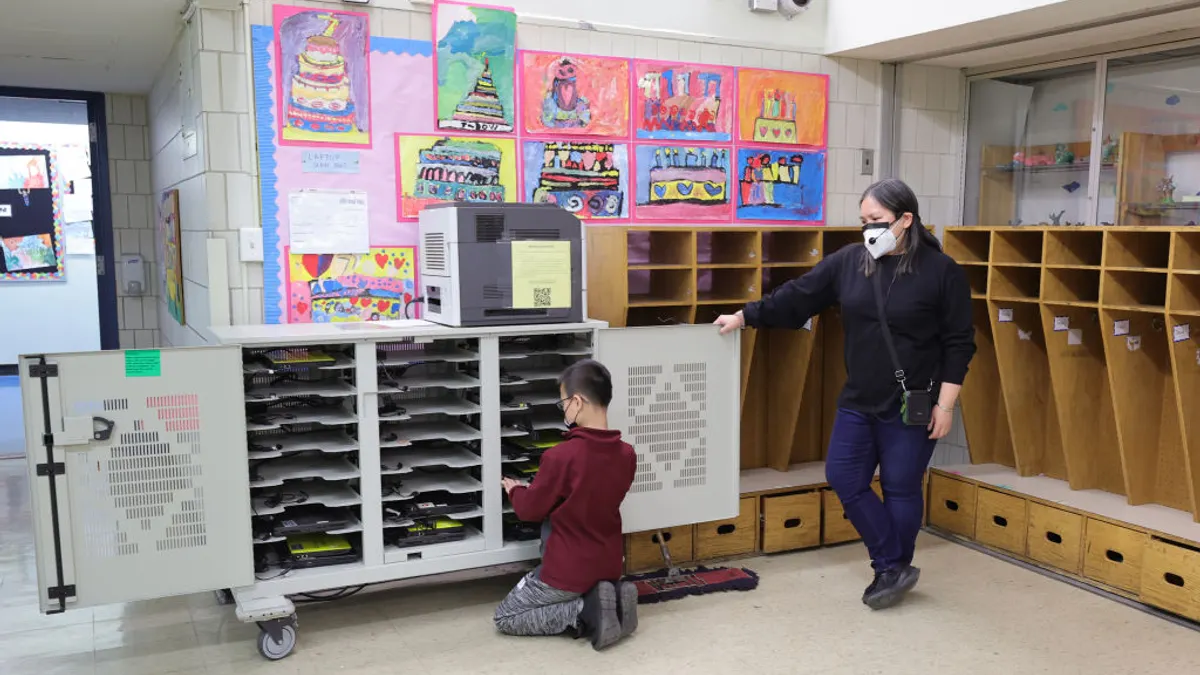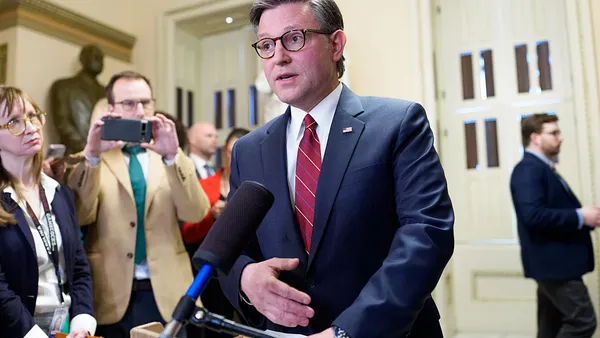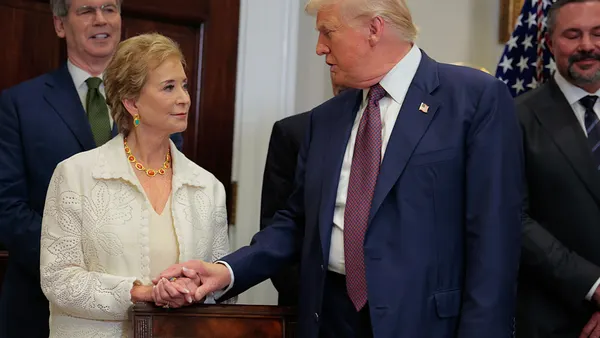Dive Brief:
- The U.S. Department of Education must allow the temporary extension of federal COVID-19 emergency funds to flow to 16 Democratic-leaning states and the District of Columbia, according to an order issued by a New York federal judge Tuesday.
- In the 2-page preliminary injunction, Judge Edgardo Ramos said the Education Department is prohibited from enforcing the cancellation of funding under the Elementary and Secondary School Emergency Relief program during the litigation or until a further court order. The reprieve only applies to the states that sued for access to the funds.
- Plaintiff states had claimed the agency's March 28 cancellation of the pre-approved ESSER funding extensions was “tremendously harmful” to states, school districts, private schools and contractors. When halting the funds, the Education Department said the funding was not consistent with the agency's priorities, and that states had failed to meet spending deadlines set out in federal regulations.
Dive Insight:
Leaders from plaintiff states celebrated the order. New York Attorney General Letitia James, who led the states in the challenge, said in a statement Tuesday, "The Trump administration’s illegal decision to cut off essential education funding put some of our most vulnerable students at risk of falling behind in school."
James added that the "arbitrary and abrupt termination of the states’ access to these funds is causing a massive, unexpected budget gap that will hurt students and teachers by cutting off vital education services."
Joining James in the lawsuit are the attorneys general of Arizona, California, Delaware, Hawaii, Illinois, Maine, Maryland, Massachusetts, Michigan, Minnesota, New Jersey, New Mexico, Nevada, Oregon, and the District of Columbia, as well as the governor of Pennsylvania.
In their lawsuit, the states said the inability to access the funds led to the pause of tutoring services, building improvements, reading interventions, after-school programming and more. They also predicted layoffs for district and school staff if the funds were permanently ended.
While Republican-led states were not part of the lawsuit, they are also feeling the pain of the canceled extensions. Mississippi State Superintendent Lance Evans discussed the policy reversal at an April 17 state board of education meeting, saying Mississippi has about $137 million in unspent funds that were previously approved for spending extensions. Evans said state leaders were communicating with about 68 districts that were expecting the funds.
In an April 2 letter to U.S. Education Secretary Linda McMahon, Evans wrote that the money had been targeted for instruction to address COVID-related learning gaps, support for homeless students, school nursing and mental health services, and facility repairs and improvements. The sudden reversal of those funds “is detrimental to Mississippi students,” he added.
"These are not merely numbers on a spreadsheet; they represent critical services and supports that directly benefit our most vulnerable students," Evans said.
The Education Department gave states an option to reapply for access to their ESSER funds. The Education Department did not respond to a request for comment about the order.
Most states have spending extensions
The regular and staggered spending deadlines for all three congressionally approved allocations under ESSER expired, with the last deadline for American Rescue Plan funds being Jan. 28.
The Education Department told K-12 Dive in late February that about $2.5 billion out of a total $121.9 billion in ARP-ESSER funds were left to be spent by districts in the 41 states, Puerto Rico and the District of Columbia that had requested and received extensions. About $433 million was left to be spent by states under ARP’s Emergency Assistance to Non-Public Schools allocation to support COVID recovery efforts in private schools.
States with ARP-ESSER spending extensions are supposed to have until March 30, 2026, to liquidate the funds.
The states' lawsuit said the Education Department had approved spending extension requests from several states in the first few weeks of the second Trump administration, including to Illinois, Maryland, New Mexico and Pennsylvania. However, most of the spending extensions for all three allocations were approved under the Biden administration.
Congress approved the COVID emergency funds in 2020 and 2021 for pandemic recovery efforts.







 Dive Awards
Dive Awards






